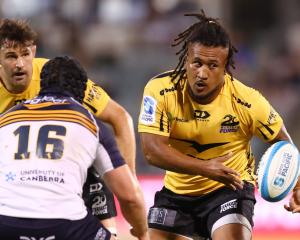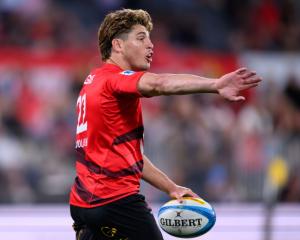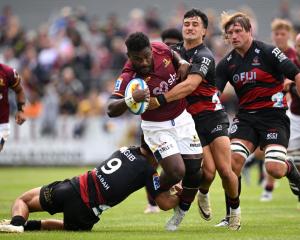In the simple world of economics, there is something about Japanese rugby which does not stack up. Something totally out of kilter from all other basic laws of supply and demand.
This is a competition in which one club paid Sonny Bill Williams more than $1 million for one season. Injury meant he played only six games.
Yet some games attract crowds of maybe 1000. Even the final of the Japanese top league did not even get 30,000 through the gate.
So how can these clubs pay so much for players?Players never say how much they get but it is often double or triple what they can receive here.
A good Super 15 player can get more than $250,000 a year in Japan. An All Black, way more than that.
Pirates coach Paul Miller, who played for the Highlanders, Otago and Southland, and also played two games for the All Blacks in 2001, spent five years in Japan.
When asked what attracted players to Japan, he gave the short answer: ''Money''.
''It is about bragging rights, really. That is why they got Sonny Bill Williams over there. You are talking about multibillion-dollar companies, so something like they paid him is just a wee chink in the armour in terms of the budget.
''It does not seem to worry them at the moment.''
Otago coach Tony Brown went to Japan in 2004 and is still involved. He played for seven years and is now a coaching adviser for the Panasonic side.
''The companies put a lot of emphasis on supporting their sports teams,'' Brown said.
''The budget is massive. You are talking four to five times what a Super rugby team would spend. You have 45 players and they are all paid.
''All of the gate for the games goes to the Japan Rugby Union so the companies have all the logistical stuff to pay for. But it is a very professional set-up.''
Miller, who played for the Kurita Water company in the Japanese second division, said players could extend their careers for two to three years easily in Japan.
The style of play was different from New Zealand rugby, and the body did not take as many hits.
''You don't wake up the next day sore. It is very fast rugby. You'll get up from the ruck and the ball will be on the other side of the paddock. It is just not confrontational.
''You look at someone like Tamati ... and he can extend his playing career by another two to three years just because of the fact it is way less physical.''
Brown said with a very long pre-season - sometimes up to three months - players had time to rehabilitate injuries and get bodies right for the season.
The season starts in autumn and finishes around the end of February.
All Blacks were highly prized, not only by the bosses.
''A prestigious All Black is held in high regard,'' Brown said.
''The Japanese players really want to play with All Blacks and measure themselves against them.''
Seasons feature about 15 games plus semifinals and finals. This is compared to the 30-plus games top All Blacks are expected to play in New Zealand. And Japan has six months off from playing.
Miller said the teams trained more than they played.
''Training is all about time rather than quality. If they say we'll train for two hours, then they'll train for exactly two hours, no matter how good or how bad it is going.''
The lifestyle depended a lot who was around you and Miller said it could be hard on partners.
''It really depends on what your support networks are like. If you have other Kiwis around you then it will be fine. But it is different than England. You can be home by plane in 11 hours and you get a month off at least.''
Miller said his first two years flew by but it dragged near the end, and he ''had to fight to get to the end of the tunnel''.
Brown said with Japan hosting the World Cup in 2019, the sport was only going to get bigger in Japan.
''The standard has definitely improved a hell of a lot. The quality of player is better and getting younger.''
Otago and Highlanders players
Who have played in Japan in the past five years
Mike Delany, Tom Donnelly, Brett Mather, Isaac Ross, Steven Setephano, Alando Soakai, Ezra Taylor, Hayden Triggs, Adam Thomson, Tamati Ellison, Karne Hesketh, Uili Kolo'ofai, Andrew Parata, Michael Hobbs, Siale Piutau, Justin Ives, Andrew Stead.












